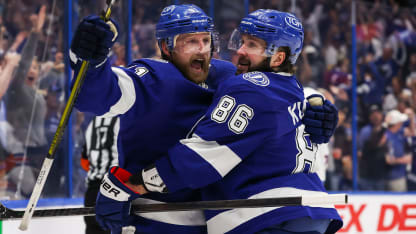TAMPA -- Who played well in Game 3 of the 2022 Stanley Cup Final? Sometimes it's easy to tell, sometimes it isn't. NHL.com graded the players in the 6-2 victory by the Tampa Bay Lightning against the Colorado Avalanche at Amalie Arena on Monday. The Avalanche lead the best-of-7 series 2-1 with Game 4 here on Wednesday (8 p.m. ET; ABC, ESPN+, CBC, DSN, TVAS). Here are the players and trends that stood out the most.
Stamkos, Kucherov among top performers for Lightning in Cup Final Game 3
Honor roll, stock watch from Tampa Bay's win against Avalanche

Honor roll
Steven Stamkos (Lightning) -- Without a point in either of the first two games of the Final, the Lightning captain exhibited strong leadership qualities with an aggressive, determined game that included his first offensive contributions of the series. And they came at important times. He scored his first goal of the series at 7:52 of the second period to make it 4-2, getting open in the slot when the Avalanche were caught puck-watching, and set up Ondrej Palat for the 2-1 goal at 14:54 of the first period that put Tampa Bay ahead to stay, its first lead of the series.
Nikita Kucherov (Lightning) -- After a background performance in Game 2, in which he had no shot attempts, Kucherov showed up for Game 3 with creativity and quickness. He contributed two assists in a four-goal second period when the Lightning took control of the game, had nine shot attempts, six of them on goal, and was plus-3, giving a strong bounce-back effort. Kucherov has 26 points (seven goals, 19 assists) in 20 playoff games this season. He is the fourth player in NHL history to score 25 or more points in three consecutive postseasons, joining Wayne Gretzky (1983-85), Mike Bossy (1981-83) and Bryan Trottier (1980-82). It was his seventh career multi-point game in the Stanley Cup Final, passing Sidney Crosby and Patrick Kane, each with six, for the most among active players.
Gabriel Landeskog (Avalanche) -- The Avalanche captain scored two goals and was a focal point in Colorado's early drive in Game 3. Landeskog was pointless in Colorado's runaway 7-0 win in Game 2 but had two points in the 4-3 overtime win in Game 1. He has 21 points (11 goals, 10 assists) in 17 playoff games this season, continuing to raise the bar on his career-best postseason production.
Victor Hedman (Lightning) -- Hedman was minus-3 in Game 2 but returned to form with a strong outing in Game 3. His game was less about highlight-reel plays and more about steady puck-moving and smart decisions, being in the right place at the right time and defending with solid plays. He had two assists and led Tampa Bay with 24:13 of ice time.
Corey Perry (Lightning) -- Perry scored his first goal of the Final on the power play at 14:58 of the second period but his contributions went way beyond that. He was one of the Tampa Bay leaders who spoke up after Game 2, saying the team needed to be more committed and play more on its toes and he backed up the talk with an effective, aggressive game, not to mention irritating several opponents -- which always indicates he's doing his job -- in the one-sided victory. Perry had four shots on goal in his 17:10 of playing time.
RELATED: [Stanley Cup Final coverage | Stanley Cup Final schedule]
Stock watch
Andrei Vasilevskiy (up)-- Up was the only trajectory that was realistic for Vasilevskiy, who came into the game with a 5.45 goals-against average and .838 save percentage in the Final. This was the more-in-character performance that many had expected in Game 2 when he was victimized for seven goals. In Game 3, Vasilevskiy made 37 saves and looked especially dialed in when the game was still in jeopardy in the first 28 minutes.
Avalanche power play (up) -- Colorado went 2-for-4 in Game 3, scoring on its first two man-advantages of the game, and is 5-for-11 in the Final. The Avalanche lead the playoffs with a 33.9 percent success rate with the man-advantage (19-for-56 in 17 games) and the Lightning will no doubt be focused on some kind of strategy adjustment to limit future damage.
Darcy Kuemper (down) -- The Avalanche goalie was not overworked in two victories at home but did his job steadily with a 1.48 GAA and .923 save percentage in those games. In Game 3, Kuemper faced an increased number of point-blank chances but he was not sharp and was pulled at 6:47 of the second period after allowing five goals on 22 shots.
Cale Makar (up, then down) -- The dynamic Avalanche defenseman did some strong work in the early stages of the game, quarterbacking the Colorado power play to its two goals, assisting on each. That extended his lead as the top scorer among defensemen in the playoffs, with 26 points (seven goals, 19 assists) in 17 games. But Makar was on the ice for three of Tampa Bay's five even-strength goals, when some puck-watching and loose defensive play contributed to Colorado's first defeat of the series and first road loss of the playoffs.
Pierre-Edouard Bellemare (up) -- Tampa Bay's bottom-six center had his third straight winning game in the face-off circle, 8-for-10; he's 22-for-30 in the Final. That's best among Tampa Bay players who have taken at least five face-offs per game. It's a subtle game within the game but it's important for the Lightning that this trend continues if they're going to contest the actual possession numbers in the series. Getting control of the puck from face-offs is one important element in trying to limit the high-powered Avalanche, from first line to fourth line.
What we learned
Lightning have the champions' pedigree
As grim as things looked for Tampa Bay after being blown out in Game 2, it was evident that having won the Stanley Cup in the previous two seasons counts for something. The Lightning knew what some of the remedies were for losses in the first two games of the series and applied those lessons on home ice, mainly to get on their toes and make it tougher for the quick Avalanche to dictate the pace and style of game. Raising the quality of their own game has now made this a series.
Avalanche didn't match Lightning aggression
Colorado was knocked off its momentum from the first two games, failing to create a single even-strength goal in Game 3 after creating seven in Games 1 and 2. The Avalanche's first period was anything but terrible, despite trailing 2-1, but when the Lightning continued to push, forecheck aggressively and limit space for attack in the second period, the Avalanche did not match that intensity and allowed four goals. One thing it did prove is that when a team plays a near-perfect game, which Colorado's Game 2 was, it's tough to replicate for two reasons. One is that the standard set is so high and the other is that the opposition, especially this deep into the playoffs, will not sit idly by and accept it.
















